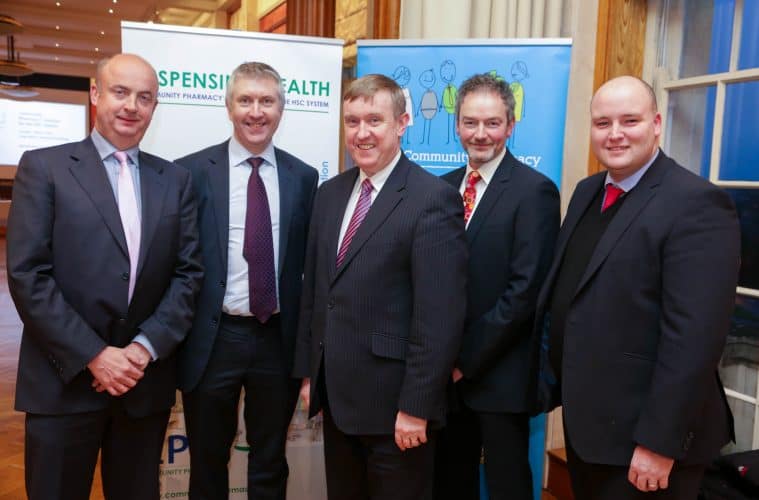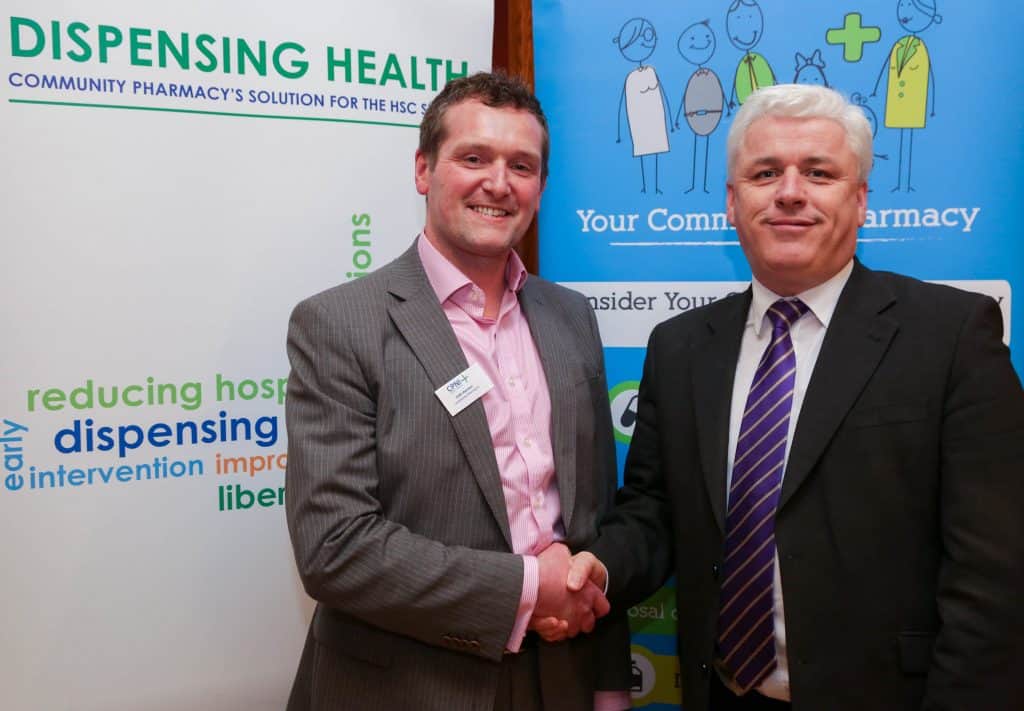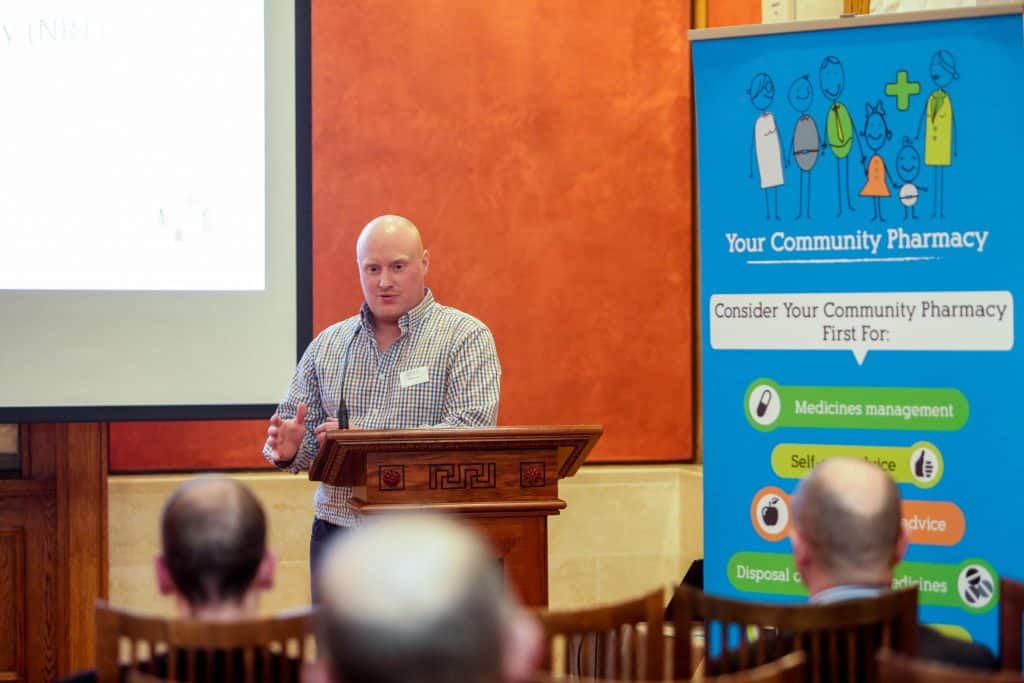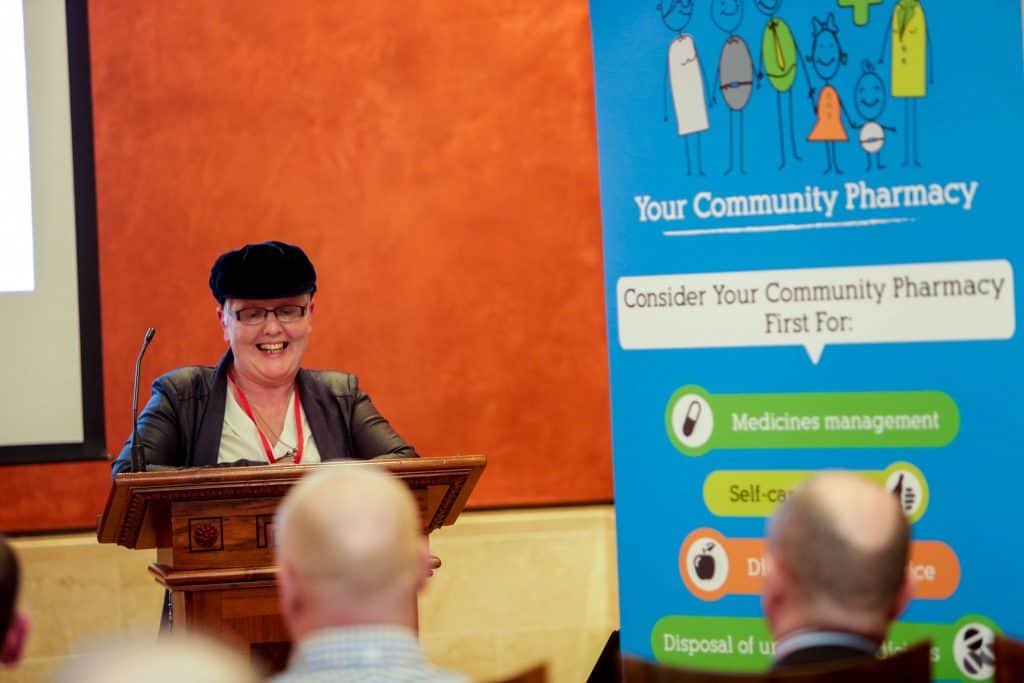Community Pharmacy NI (CPNI) held a Long Gallery event at Parliament Buildings on 1st March to launch “Dispensing Health: Community Pharmacy’s Solution for the Health and Social Care System.”
With 123,000 people accessing community pharmacies every day in Northern Ireland, community pharmacy is the most accessible HSC resource. Using evidence-based solutions, the CPNI paper focuses on six key action areas which if addressed would enable the community pharmacy profession to fully utilise its unique accessibility and clinical skills to help relieve some of the pressures that exist across the Health and Social Care (HSC) system. All proposals within the document are entirely consistent with the Department of Health, Social Services and Public Safety (DHSPPS) Making it Better through Pharmacy in the Community Strategy and Medicines Optimisation Framework.
During the course of the evening, kindly sponsored by Paula Bradley MLA, the audience which included MLAs, patients, statutory organisations, voluntary groups, community and hospital pharmacists had the opportunity to find out more about the ways in which the 123,000 individuals visiting community pharmacies every day are supported. The evening was met with enthusiasm with many delegates welcoming the solutions contained in the booklet.
Speaking at the event, Fearghal McKinney MLA, Deputy Leader of the SDLP and the party’s health spokesperson said, “Community pharmacies are a front door to the health system and play a vital role in filtering out a number of less serious medical cases. The solutions in the Dispensing Health document are evidence-based examples and clearly demonstrate how community pharmacy can relieve pressure on other parts of the Health and Social Care (HSC) System”.
Presentations examined local healthcare initiatives and the positive impact they are making to patients in their communities and also looked to the future with glimpses into some local community pharmacy innovations.
First up was Eoghan O’Brien, community pharmacist and nominated pharmacist, Antrim/Ballymena ICP who looked at the Current Opportunities in Community Pharmacy. These included the Minor Ailments Service, Medicines Use Reviews, community support and public health, specifically the Smoking Cessation Service. During his presentation Eoghan was joined by one of his patients who added their own unique perspective. Previously a smoker of 20-30 cigarettes per day for 18 years, Paddy McErlean successfully stopped smoking through the Smoking Cessation Service delivered by Eoghan. This has had a major impact on Paddy’s health and well-being and in his own words his life has been ‘transformed’.
The Community-Focused Approach of community pharmacy was explored in a presentation by Mary O’Hagan, Monitoring Officer, Building the Community-Pharmacy Partnership (BCPP).
Mary looked at the wide-reaching impact and engagement that took place between the community pharmacists and local groups in one year. During this time frame, 62 projects were funded, equating to 1024 sessions with 1662 core participants. Mary catalogued that community pharmacists delivered 786 group and 821 tailored one-to-one support sessions, resulting in a positive impact on participants with 70% making healthy changes to the way they live, 81% understood how to improve their health and 84% knew more about health and local health services. The programme also had a positive long-term impact on the social and economic aspects of the participants lives, as with their improved confidence and skills set, 44 people started volunteering and a further 4 individuals secured employment. Projects included issues such as: chronic health, pain management, lifestyle, sexual health, alcohol and drugs. As well as wider social issues such as isolation, relationships and debt.
The topic, New Models of Care was delivered by Raymond Anderson, Community Pharmacist and Clinical Lead Pharmacist, Craigavon and Banbridge ICP. During his presentation: Managing Long-Term Conditions in the Pharmacy, Mr Anderson talked about a pilot he had carried out to establish and prove the concept that patients with long-term conditions can be effectively and safely managed by a pharmacist independent prescriber from a community pharmacy. In this case it was to review hypertension and asthma in the community pharmacy setting and through his presentation Mr Anderson demonstrated that this new model of care had been met favourably with both his local GP practice and those patients who received a consultation at the community pharmacy.
The last theme of the evening was Community Pharmacy Innovations. Looking firstly at an Out-of-hours Emergency Supply Pilot.
Patient requests for routine repeat medicines out-of-hours is a major issue with up to 50% of out-of-hours contacts and also visits to the Emergency Department being reported. This creates unnecessary workload and increases pressure on overstretched emergency care services as well as mounting medicines wastage. To try and combat this an Emergency Supply Service Pilot will operate for six months in the Northern LCG area. James McCaughan, Community Pharmacist from Ballycastle provided an overview of the pilot which will be available during out-of-hours periods, allowing patients to access an urgent supply of their regular prescription medicines from their community pharmacy.
The Focus on Innovation theme continued with a presentation on an Integrated Discharge Support Service Pilot given by Professor Mike Scott, Director, Medicines Optimisation Centre (MOIC). During the course of the presentation, Professor Scott looked at the reasons why we need medicines optimisation, outlined the Medicines Optimisation Quality Framework and highlighted the work of the Medicines Optimisation Innovation Centre (MOIC).
*Presentations are available to view within the members section of CPNI’s website: www.communitypharmacyni.co.uk
If you would like a copy of the Dispensing Health booklet please email info@communitypharmacyni.co.uk or call 028 9069 0444







